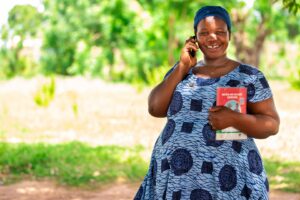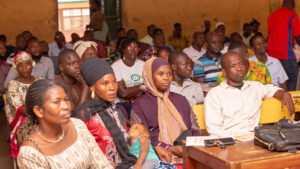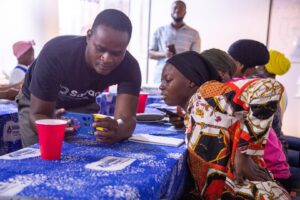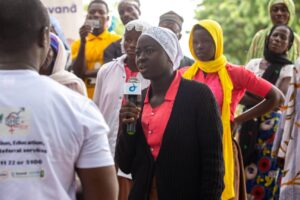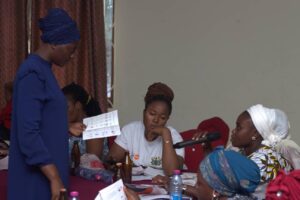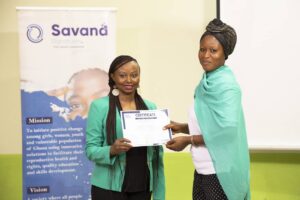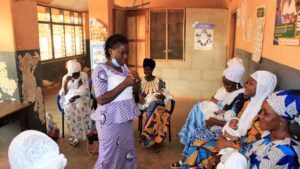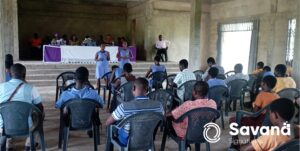Over the years, we have led the use of digital...
Read MoreEmpowering Adolescent Mothers to Safeguard their Future
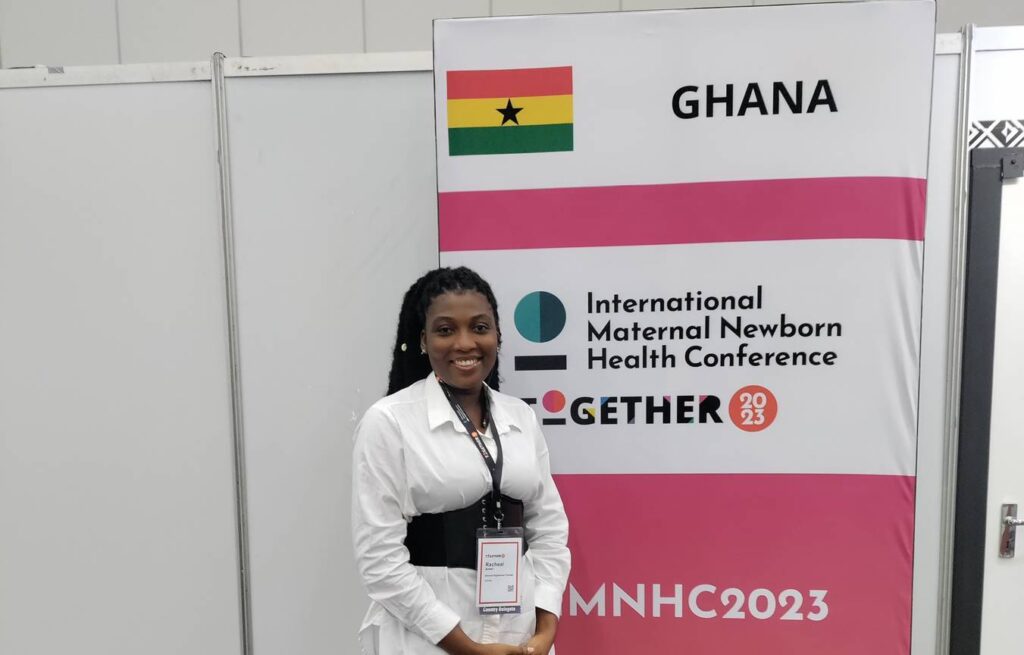
In a small village nestled in the heart of Ghana lived a bright, ambitious young girl named Owusua. Her vibrant spirit captivated everyone she encountered, and she was filled with dreams for the future. However, her life took an unexpected turn when she discovered she was pregnant at the age of fifteen.
Owusua’s pregnancy brought forth a wave of emotions and challenges, starting with her parents’ reaction. Filled with disappointment and anger, her parents struggled to accept the news, feeling ashamed and worried about how the community would perceive their family. Their cold and distant attitude left Owusua feeling isolated and unsupported during a time when she needed love and guidance the most.
Seeking healthcare and support, Owusua visited a local health facility, only to encounter the suffocating stigma surrounding teenage pregnancy. Both healthcare staff and fellow patients met her with judgmental glances and condescending whispers, further adding to her feelings of shame and inadequacy.
Unfortunately, the attitudinal challenges from health workers persisted during her antenatal care (ANC) and postnatal care (PNC) sessions. Not only did she lack tailored ANC care for adolescents, but some healthcare professionals displayed a lack of empathy and understanding, treating her with indifference or disdain. Their demeaning remarks and negative attitudes deepened her sense of unworthiness, making seeking essential healthcare a distressing experience. Sadly, these attitudinal challenges faced by adolescent mothers are all too common, as health workers may hold pre-conceived notions about teenage pregnancy, viewing it as a result of moral failure or irresponsible behaviour. This perpetuates a cycle of marginalisation for these young mothers.
Owusua’s story is a heart-wrenching one, but it is not unique. Many adolescent girls around the world who get pregnant along the way face similar challenges. It was thus not surprising that this issue took a centre stage at the just ended international conference on maternal and newborn health in South Africa. The conference, which I had the privilege of participating, brought together experts, practitioners, and organisations from academia through health to development the development space around the world, all united by a common goal; to improve the well-being of mothers, newborns, and adolescents.
The conference was a melting pot of knowledge and ideas, offering a platform to discuss innovative strategies, share success stories, and address challenges. A major highlight of the conference for me and many practitioners in the development field was a session on the topic: ‘Tailored Maternal and Newborn Health Strategies for Adolescents’.
One of the sobering statistics shared during the session shed light on the global magnitude of teenage pregnancies. According to the World Health Organization (WHO), approximately 12 million girls aged 15-19 give birth each year, with the majority residing in low and middle-income countries. These young girls face numerous challenges, including an increased risk of maternal mortality, limited access to quality healthcare, inadequate social support, educational disruptions, and heightened vulnerability to poverty.
Examining Ghana specifically, where Owusua’s story mirrors those from around the world, the statistics paint a disheartening picture. According to a BioMed Central study that was published in February 2023, in Ghana, 76 per 1000 births are born by teenage mothers between the age of 15 to 19 years, whereas the global figure is 49 per 1000. The staggering figures emphasise the urgent need to address the root causes and provide tailored support systems to ensure a brighter future for these young girls and their newborns. Teenage mothers often encounter multifaceted issues such as stigmatization, discrimination, and limited economic opportunities. They face difficulties accessing antenatal care and postnatal care services due to judgment from health workers, and their health issues are often overlooked. These challenges perpetuate a cycle of poverty and inequality, hindering their ability to break free from the hardships they face.
Despite these challenges, hope remains. The session emphasised the significance of implementing targeted interventions that address the specific needs of adolescent mothers. Comprehensive sex education programmes should be integrated into school curricula, equipping young girls with knowledge about reproductive health, contraceptives, and family planning. Empowering girls with information enable them to make informed decisions and reduces the occurrence of unintended pregnancies.
Establishing accessible and youth-friendly healthcare services that cater specifically to the needs of adolescent mothers is crucial. These services should encompass antenatal care, safe delivery options, postnatal support, and guidance on infant care. By ensuring that healthcare services are readily available and tailored to the unique needs of young mothers, we can enhance maternal and newborn health outcomes and foster a supportive environment.
Furthermore, providing educational opportunities and vocational training for teenage mothers can have a transformative impact on their lives. By equipping them with skills and knowledge, we enable them to overcome barriers and build a brighter future for themselves and their children. Efforts should also be made to combat societal stigmatization by raising awareness and promoting acceptance of teenage mothers, fostering an inclusive and supportive environment.
One consensus reached during the conference was the urgent need for sensitisation and training programmes for healthcare professionals. By incorporating comprehensive training on adolescent health, including cultural sensitivity, communication skills, and the elimination of biases and stereotypes, health workers can provide compassionate and non-judgmental care. These programmes will help address the attitudinal challenges faced by adolescent mothers and ensure that healthcare providers offer supportive and inclusive services.
Moreover, the staggering numbers of teen pregnancies worldwide highlight the urgent need for Integrated Sexual and Reproductive Health Education. Another consensus reached was the importance of integrating comprehensive sexual and reproductive health education into school curricula. By equipping young girls with knowledge about reproductive health, contraceptives, and family planning, we can empower them to make informed decisions and reduce the occurrence of unintended pregnancies. This education should focus on destigmatising teenage pregnancy and promoting responsible sexual behaviour, ultimately improving maternal and newborn health outcomes.
As I left the conference, I carried with me a renewed sense of urgency and hope. Working for an organisation that prioritises Maternal and Newborn Health and Adolescent Reproductive Development, it is crucial for us to internalise these key learning points and integrate them into our strategies and programmes. By adopting a holistic approach that addresses the unique needs of different populations and harnesses the power of partnerships, we can make substantial progress in achieving our shared goal of ensuring the health and well-being of mothers, newborns, and adolescents worldwide. Together, we can empower and uplift adolescent mothers like Owusua, rewriting their stories and nurturing a generation that embraces the limitless potential of every young mother and her child.
In the words of one of the speakers, Immaculate Amoit, Executive director of WETEC Kenya, “We should not let adolescent mothers be invisible because as long as they are invisible, they will suffer discrimination in accessing MNH care.” It takes a compassionate society to empower and uplift adolescent mothers.
Related Stories
Savana Signatures Re-Launches Exchange Prog. Between Ghana and the Netherlands
Savana Signatures has announced the revival of its educational exchange...
Read MoreFemale artisans empowered with digital tools to boost businesses
Referred to as Digital Champions, the beneficiaries who are leaders...
Read MoreSavSign TV Promotes AgooSHE+ Helpline in Mamprugu Moagduri
At the core of the AgooSHE+ Helpline's mission is empowering...
Read MoreEmpowering Healthcare Providers to Enhance Family Planning in Northern Ghana
We have empowered healthcare professionals to provide family planning services...
Read MoreOne-year postpartum care trial shows positive maternal health outcomes
One-year postpartum care trial shows positive maternal health outcomes Findings...
Read MoreRisking A Life To Bring A Life: The postpartum situation in Ghana
Risking A Life To Bring A Life: The postpartum situation...
Read MoreSavana Signatures educates PWDs on GBV, HIV/AIDs
PWDs were introduced to the AgooSHE+ Helpline whey they can...
Read More
